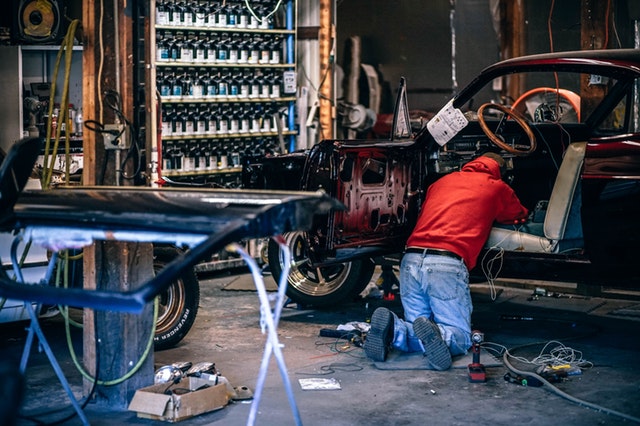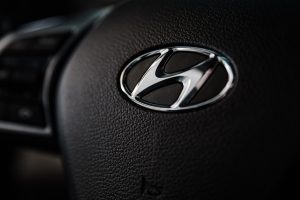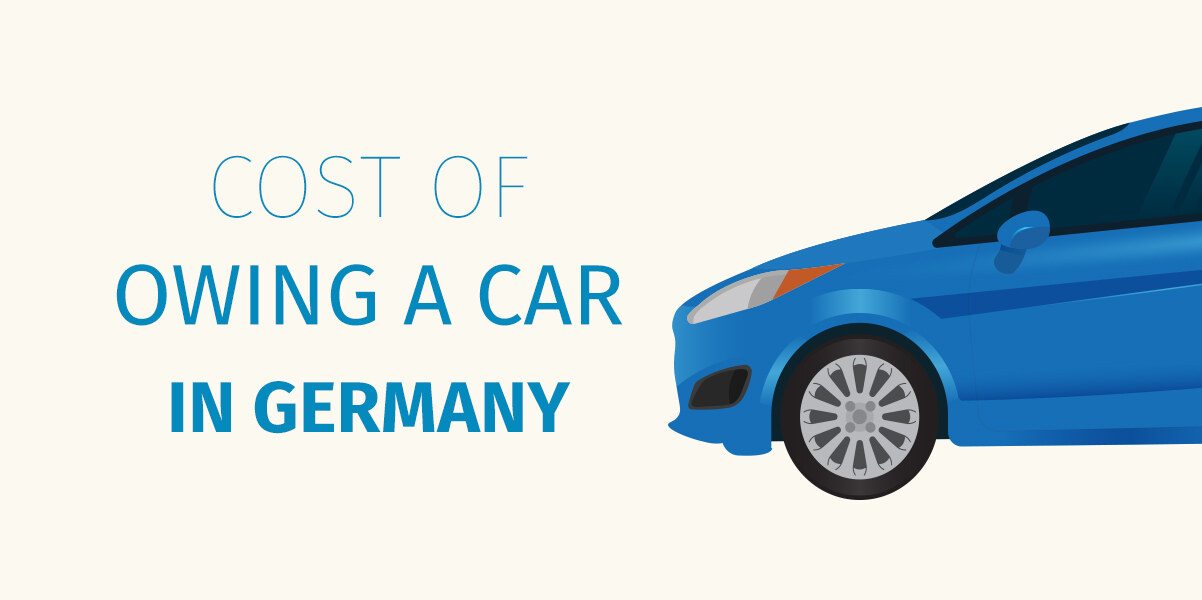Owning a car in Germany – Cost Estimation
Let’s assume you already have a driving license (driving license in Germany costs on an average 1500–2000€) and have ready purchased a car. Buying a car in Germany depends on your budget. As per my experience, the cost of owning a car in Germany is as follows:
- Car registration (Kfz-Zulassung): The first thing you will have to pay for is the registration at the KFZ – Zulassungsstelle. This may cost around 27–30€. It will cost you more if you select a desired license plate number.
- Number plates (Kfz-Kennzeichen): The next cost will be related to buying number plates. This should cost around 10–15€.
Hint: If you are planning to buy a used car that is already registered, you can think of keeping the existing license plate number (Discuss it with the current owner, to be polite!). This will save you the additional cost of buying a new license plate.
- Future Modifications to vehicle paper(s): You will incur a small fee anytime in the future when you need to change any details in the vehicle papers (Zulassungsbescheinigung). For example, when you move to a new address, you need to pay a small fee for changing the address in Zulassungsbescheinigung Teil 1.
- Winter tires (Winterreifen): The German law stipulates that winter tires, or even tires that comply with Directive 92/23 / EEC, must be used when “black ice, snow, slush, ice or frosted ice” prevails (§ 2 (3a) StVO). As a result, you will need to buy two sets of tires – Summer and Winter (It is not recommended to use winter tires in summer as they wear down quickly in warm temperature and also reduce the performance of the car). You can either buy:
- Just the rubber tires (Reifen): In this case, you will pay less up front, but you will have to pay more every time you have to get them changed at a garage (You can do it yourself if you are an expert).
- Tires with rim (Reifen mit Felgen): In this case, you will pay more upfront, but you will have to pay less every time you have to get them changed at a garage. Also, you can change the tires on your own with a need of much expertise.
SEE ALSO: How to convert an existing driving license to a German driving license?
Apart from these, you will incur some regular costs:
- Motor vehicle taxes ( Kfz-Steuer)
For newer cars, the tax is calculated on basis of vehicle engine type, capacity, and CO2 value. For older cars, it is calculated on basis of emission class. The tax has to be paid on yearly basis.
You can calculate the tax amount here: Kfz-Steuer-Rechner – Bundesfinanzministerium – Service
- Insurance (Kfz-Versicherung)
The insurance amount depends on the type and power of the car. It also depends on which accident-free class (Schadenfreiheitsklassen – SF Klasse) you are in. The insurance amount goes lower every year you have an car insurance and remain accident-free (as a result of own fault). The insurance amount goes up every time you use the insurance. It is higher for persons with a new license and/or if they are below a certain age (usually 18–24 years). You can check the SF-classes here (in German): Schadenfreiheitsklassen im Überblick (SF-Klassen)
- The insurance can be divided into 3 main types:
-
- Kfz-Haftpflichtversicherung (Mandatory) = Liability or third-party coverage
This type of car insurance is a minimum legal requirement to be able to register your car. It covers all the damages
-
-
- you might do while driving to other people or
- other cars or things in case of an accident
- medical bills if someone is injured
- It doesn’t cover any damages done to your own car
- Teilkasko (Optional: add-on to Haftpflichtversicherung ) = Partial coverage
-
This type of insurance may cover:
-
-
- theft-attempts or theft themselves,
- accident with an animal,
- fire,
- glass damages,
- thunderstorms, etc
- Vollkasko (optional: add-on to TeilKasko) = Comprehensive coverage
-
This type of insurance covers any damage to your own car (in addition to (a) and (b)) as a result of an accident, even if it is your fault.
Teilkasko is only a little more expensive than Haftpflichtversicherung. But getting Vollkasko drives up the insurance amount quite a lot. I would recommend getting at least Teilkasko. One way of having a lower insurance amount for Teilkasko and Vollkasko is to provide a higher excess to be paid by yourself (Selbstbeteiligung) in case if you need to use the insurance.





General inspection (Hauptuntersuchung – HU) and exhaust emission test ( Abgasuntersuchung – AU)
It has to be performed every 24 months for all cars. It is relaxed to 36 months for some types of vehicles (for example, Pkw category) if it is the very first inspection (Erste Untersuchung). This will cost around 90-100€(This doesn’t include any repairs if required!)

Changing tires every summer and winter (if you don’t do it on your own)
If you don’t change tires/wheels on your own, every year you will end up paying twice (summer and winter) for changing tires.
-
- For tires without rims, this can cost between 20–35€ per Tyre.
- For tires with rims, this can cost between 7–15€ per wheel.
Source: Preisradar Reifen wechseln

Inspection, Maintenance, and Repairs
To keep your car running smoothly you will need to perform regular inspection and maintenance (Inspektion und wartung) as per manufacturer’s specifications (For example changing OIL, air filter, pollen filter, etc) every 1–2 years. This can cost you around 200–400 Euros every time; and once in a while around 400–800€ when some major maintenance/replacement of parts has to take place.
Once in a while, doesn’t matter how much care you take of your car, something is going to go wrong. You will also end you paying for the repairs. In Germany, minor repairs can also cost a lot (esp. due to expensive labor costs). For example, I had a stone hit on my cars condenser (insurance only covers stone hit to exterior car body), which caused it to become leaky (and no cool air from the A/C as a result). I had to pay 170€ for the replacement parts (new condenser + A/C gas) and more than 400€ in labor charges!

Parking
This is something that should not be taken lightly, esp. if you live towards the center of a big city. Parking space or a garage can cost up to 100€ or more a month.

Car wash
This is one of the smaller cost that accumulates over time if you wash your car regularly. In Germany, you are not allowed to wash cars in the street or in your own garage if it doesn’t have a special drainage system. If you take the car to an auto wash (Autowaschanlage), it can cost between 8–20€ every time.
Hint: Some shops provided you a place, water, and soap to hand wash your car. If you are not afraid to get your hands dirty, you can save a lot of money (It cost 2–5€ to wash this way every time).

My estimate for regular costs that are incurred on my Hyundai i30 are:
- 500–700€ per year for Insurance (Vollkasko) + Vehicle taxes
- 100€ every 2 years for HU/AU
- 25€/month for Garage (I live in a small City)
- 250€ on an average for a small inspection every 2 years (I have not had a large inspection yet!).
- I purchased Tires with rims and change them myself every change of season.
- My suggestion is to keep 500€ a year aside for any repair or if larger maintenance is required.
Download our Android app from the Google Play store to get all the information about, living, studying and working in Germany all in one place.
More from Study in Germany
FAQs about Studying in Germany | Airports | Preparation and Arrival | Masters | Bachelors | PhD | Student in Germany | Life in Germany | Part-time Jobs | Working in Germany | Driving in Germany | Housing in Germany | Integration | Comparisons between Countries | Traveling in Europe
0 comments
Leave a Comment


Your comment is awaiting moderation.
Ребяческие песни являются неотъемлемой частью детства, создавая волшебное окружение, заполненное радостью, улыбками и мемуарами, которые будут сопровождать малышей на протяжении всей жизни. Эти обыкновенные мелодии не только приносят удовлетворенность и удовольствие, но и играют важную роль в развитии маленьких разумов.
Развитие Речи и Языковых Способностей
Ребяческие песни – это сложно приятные мелодии, они также являются мощным прибором для развития речи и языковых навыков у малышей. Слова песен обычно ординарны и с легкостью усваиваются детьми, что способствует расширению словарного запаса. Рифмованные стихи и повторяющиеся пассажи подсобляют детям развивать навыки произношения и обогащать Свой язык.
Обучение Числам и Буковкам
Многие детские песни предоставляют замечательные способности для изучения чисел, букв и других базовых понятий. Поющие алфавиты, счеталки и песни о цветах становятся включая увлекательным развлечением, а также эффективным образовательным средством. Малыши могут не подмечать, как обучаются, поэтому что они слишком погружены в веселую атмосферу песен.
Формирование Эмоционального Интеллекта
Детские песни довольно частенько выражают разнообразные эмоции, помогая махоньким детям разуметь и выражать свои чувства. От радости до тоски, от экстаза до удивления – музыкальные композиции дозволяют детям исследовать и разуметь свой эмоциональный мир. Это принципиальный нюанс развития чувственного ума, который понадобится им в будущем.
Физическое Развитие и Координация Движений
Танцевальные элементы в детских [url=https://rutube.ru/video/f2314793fc4ad60e3e42aaee8cbdcc02/]https://rutube.ru/video/f2314793fc4ad60e3e42aaee8cbdcc02/[/url] песнях способствуют физическому развитию малышей, развивают координацию движений и моторику. Движение в темпе музыки помогает малышам осваивать пространство вокруг себя, улучшая баланс и упругость. Такие занятия включая полезны для физического здоровья, но и предоставляют детям возможность выражать свою особенность и творчески.
Создание Семейных Мемуаров
Ребяческие песни играют главную роль в формировании семейных традиций и воспоминаний. Общее пение между семьи или друзей крепит связи, создавая теплые и незабываемые моменты. Впечатления от общего исполнения любимых песен остаются в сердцах и мемуарах, становясь частью семейного фольклора.
Детские песни – это не просто развлечение; они – мощный инструмент для развития и обучения малышей. Родители, воспитатели и учителя применяют музыку как креативный и радостный способ вовлечения детей в процесс обучения, делая его увлекательным и эффективным. Таким макаром, волшебство ребяческих песен не прекращает расцветать в сердцах махоньких слушателей, формируя будущих творцов, мыслителей и любителей музыки.
Your comment is awaiting moderation.
Ребяческие песни являются неотъемлемой частью юношества, творя волшебное окружение, наполненное радостью, улыбками и воспоминаниями, которые будут сопровождать малышей в течении всей жизни. Эти простые мелодии не только лишь приносят удовлетворенность и наслаждение, да и играют главную роль в развитии малеханьких умов.
Развитие Речи и Языковых Способностей
Детские песни – это не просто приятные мелодии, они также являются мощным инвентарем для развития речи и языковых навыков у детей. Слова песен обычно просты и с легкостью усваиваются детками, что содействует расширению словарного запаса. Рифмованные стихи и повторяющиеся пассажи помогают малышам развивать навыки произношения и обогащать собственный язык.
Обучение Числам и Буковкам
Многие ребяческие песни предоставляют замечательные возможности для изучения чисел, букв и других базовых понятий. Поющие алфавиты, счеталки и песни о цветах становятся не только лишь увлекательным веселием, да и эффективным образовательным средством. Малыши могут не примечать, как обучаются, потому что они очень погружены в развеселую атмосферу песен.
Формирование Чувственного Ума
Ребяческие песни нередко выражают разнообразные эмоции, помогая малюсеньким детям осознавать и выражать свои чувства. От радости до тоски, от восторга до удивления – музыкальные композиции дают возможность детям исследовать и разуметь свой эмоциональный мир. Это важный нюанс развития чувственного ума, который пригодится им в дальнейшем.
Физическое Развитие и Координация Движений
Танцевальные элементы в ребяческих [url=https://rutube.ru/video/cfd5d402ef6a7355f0fd8ade94d02cda/]https://rutube.ru/video/cfd5d402ef6a7355f0fd8ade94d02cda/[/url] песнях способствуют физическому развитию малышей, развивают координацию движений и моторику. Движение в темпе музыки подсобляет малышам осваивать пространство вокруг себя, улучшая баланс и гибкость. Такие занятия включая полезны для физического здоровья, но и предоставляют детям возможность выражать свою особенность и творческий потенциал.
Творенье Семейных Воспоминаний
Ребяческие песни играют важную роль в формировании семейных традиций и мемуаров. Общее пение между семьи либо друзей укрепляет связи, творя теплые и незабвенные моменты. Впечатления от совместного исполнения любимых песен остаются в сердцах и мемуарах, становясь частью семейного фольклора.
Детские песни – это сложно веселие; они – сильный инструмент для развития и обучения детей. Предки, воспитатели и учителя могут использовать музыку как креативный и радостный способ вовлечения малышей в процесс обучения, делая его увлекательным и действенным. Поэтому, волшебство ребяческих песен продолжает расцветать в сердцах малеханьких слушателей, формируя будущих творцов, мыслителей и любителей музыки.
Your comment is awaiting moderation.
Детские песни являются неотъемлемой долею детства, создавая волшебное окружение, заполненное радостью, улыбками и мемуарами, которые будут аккомпанировать деток в протяжении всей жизни. Эти обыкновенные мелодии не только лишь приносят удовлетворенность и удовольствие, а также играют главную роль в развитии малюсеньких мозгов.
Развитие Речи и Языковых Способностей
Детские песни – это не просто приятные мелодии, они также являются мощным инвентарем для развития речи и языковых способностей у детей. Слова песен как обычно просты и просто усваиваются детьми, что способствует расширению словарного запаса. Рифмованные стихи и повторяющиеся пассажи помогают детям развивать навыки произношения и обогащать Свой язык.
Обучение Числам и Буквам
Многие ребяческие песни предоставляют примечательные возможности для изучения чисел, букв и прочих базовых понятий. Поющие алфавиты, счеталки и песни о цветах становятся не только лишь интересным развлечением, но и эффективным образовательным средством. Малыши могут не подмечать, как учатся, потому что они слишком погружены в веселую атмосферу песен.
Формирование Чувственного Интеллекта
Ребяческие песни довольно частенько выражают различные эмоции, помогая маленьким детям понимать и выражать свои чувства. От радости до грусти, от экстаза до удивления – музыкальные композиции дают возможность детям изучить и осознавать меня называют Господом эмоциональный мир. Это важный аспект развития чувственного ума, который понадобится им в будущем.
Физическое Развитие и Координация Движений
Танцевальные элементы в ребяческих [url=https://rutube.ru/video/52586d5faa7c369bf08b953bc5f7d64b/]https://rutube.ru/video/52586d5faa7c369bf08b953bc5f7d64b/[/url] песнях способствуют физическому развитию малышей, развивают координацию и моторику. Движение в темпе музыки подсобляет малышам осваивать пространство вокруг себя, улучшая баланс и упругость. Такие занятия не только полезны для физического здоровья, да и предоставляют детям возможность выражать свою особенность и творчески.
Творенье Семейных Мемуаров
Детские песни играют главную роль в формировании семейных традиций и мемуаров. Совместное пение в кругу семьи или друзей усиливает связи, создавая теплые и незабываемые моменты. Впечатления от совместного исполнения любимых песен остаются в сердцах и мемуарах, становясь частью домашнего фольклора.
Ребяческие песни – это сложно веселие; они – сильный инструмент для развития и обучения детей. Предки, воспитатели и учителя применяют музыку как креативный и радостный способ вовлечения малышей в процесс обучения, делая его увлекательным и эффективным. Таким макаром, чудо детских песен продолжает расцветать в сердцах маленьких слушателей, формируя будущих творцов, мыслителей и любителей музыки.